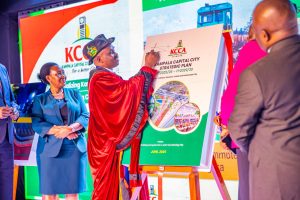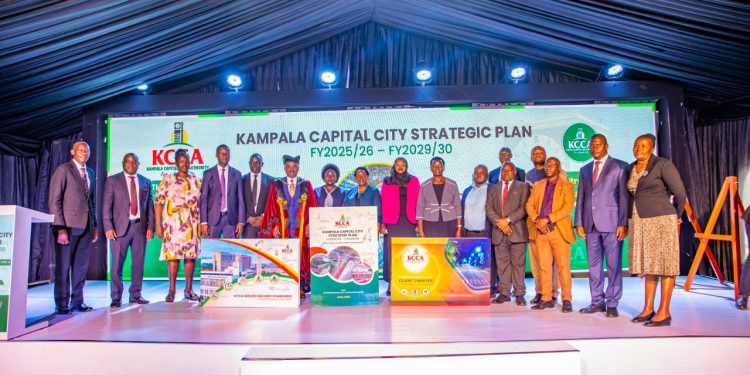Kampala Capital City Authority (KCCA) has unveiled a five-year Strategic Plan worth UGX 11.9 trillion, outlining sweeping reforms aimed at turning the capital into a functional, livable, and climate-resilient city by 2030.
The plan, launched under the theme “Revitalizing Kampala into a Functional City”, seeks financing from central government transfers, climate funds, public-private partnerships, and new instruments such as municipal bonds.
It is backed by two accountability tools—the Client Charter and Service Delivery Standards—designed to ensure the promises translate into tangible improvements for city residents.
Key targets include upgrading 325 kilometers of roads, expanding the paved network from 37% to 52%, and cutting average travel time from 4.2 minutes per kilometer to 3.0 minutes.
Drainage expansion (80 km), flood reduction at 103 blackspots, and new mass transport systems—a 14.4 km Bus Rapid Transit (BRT), extended commuter rail to Port Bell and Kyengera, plus Light Rail Transit (LRT) designs—are also top priorities. 
Waste management is central to the plan: Kiteezi landfill will be decommissioned as a new facility at Buyala comes online, raising solid waste collection from 55% to 75% and recycling from less than 1% to 30%.
On the social front, literacy levels are expected to rise to 95%, the pupil-teacher ratio cut to 30:1, and maternal and infant mortality rates reduced.
“The true measure of success will not be in the quality of these documents but in the visible transformation in our communities—clean streets, quality roads, and improved services. These are the real indicators of progress,” said Jane Kyarisima, Deputy Head of Public Service.
Markets and workspaces will also expand, with 10,000 new stalls for vendors and artisans in places such as Kamwokya, Ggaba, Usafi, and Kitintale.
KCCA further projects to increase non-tax revenue from UGX 114.3 billion in FY2023/24 to UGX 165.5 billion by 2030, while boosting its staffing levels from 53% to 80%.
Executive Director Hajjat Sharifah Buzeki described the plan as a “change tool” rather than a policy document.
“Together with my team, we believe this goal is achievable. This plan is not a mere policy document, but a change tool that will deliver a capital city of opportunity and progress. We call on all stakeholders to join us in this struggle to ensure we deliver a city that works for everyone,” she said.
Lord Mayor Erias Lukwago, often a critic of KCCA policy, welcomed the strategy.
“I’m extremely excited to see that these documents are finally here. They give us the framework to manage urban growth and to make Kampala a functional, modern city.”
Officials stressed that the plan’s success hinges on collective responsibility—from political leaders and residents to academia, civil society, cultural institutions, and development partners.
“The Plan articulates our vision of a Vibrant, Attractive, Livable, and Sustainable City. With transparency, accountability, innovation, and citizen participation, we will turn this strategy into meaningful results,” Buzeki added.





















